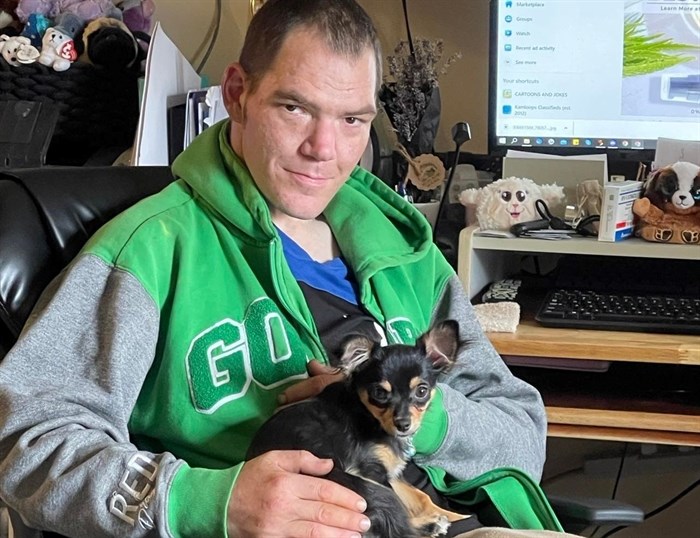
Dwayne Collins, 36, of Kamloops was killed by a train in downtown Kamloops on Oct. 2, 2022.
Image Credit: SUBMITTED/Chandra Collins
December 17, 2022 - 6:00 AM
CONTENT ADVISORY
As Chandra Collins waits for the coroner's report for more information about the tragic death of her only son in downtown Kamloops this past October, she's heartbroken over the tragic loss.
Dwayne Collins, 36, was homeless and addicted to drugs. He was killed by a passing train 150 metres from a crossing near downtown Kamloops, Sunday, Oct. 2.
"I go downtown and everyone looks like him and I just start crying,” Chandra said, adding her son had a “heart of gold.”
“He was almost always happy and would help anybody,” she said. “Dwayne was so loved and cherished, people got attached to him that worked in the shelters because of who he was. He always wanted to help others.”
Chandra knows too well the hopelessness and helplessness other parents experience when their loved one goes down the path of drug addiction, the obstacles to recovery and the public stigma.
“It is hard to say if his death was directly related to drug use but it was related to that lifestyle and the things that happen around that lifestyle,” she said. “People need to talk about this, people need to know what stuff is going on.”
Dwayne was a bright and caring child, she said. He had ADHD which created some challenges growing up, but he was always busy and had a great interest in everything electronic.
“He always had a lot of hobbies,” she said. “He wanted to be a computer technician when he grew up. He could rebuild a computer in no time. He had a lot of interests.”
Dwayne started drinking and running away from home when he was a young teenager.
“I went through a divorce and his dad was in jail,” Chandra said. “Dwayne decided he wanted to go to jail to be with his dad but of course he couldn’t. He started getting into drinking and other stuff. We never got him back on a better track.”
READ MORE: Christmas Trees of Hope for illicit drug overdose awareness in Kamloops, Kelowna
Chandra last lived with Dwayne when he was in his early 20s in an apartment downtown but she couldn’t deal with his drug and alcohol issues.
“He threw everything I owned off the balcony,” she said. “I have medical issues and I couldn’t deal with it, but I still helped him a lot. I brought him clothes and things he needed when his tent got wet or his stuff got stolen.”
Dwayne spent the past three years staying at the Rosethorn, a supportive housing complex on Victoria Street West with round the clock supervision.
Chandra said her son wanted recovery, and there were periods of time when he was clean, but he couldn’t break away from the lifestyle.
“You have to wait to get into detox, and if you do you are out seven days later and thrown back into the same shit,” she said. “There is no change so their behaviours don’t change. My son needed supports but was living around all those drugs. There is a stage where they're using drugs and safe consumption sites. There needs to be a next phase where there is a drug free, dry place with supports away from the drug scene.”
Her son was denied services from local organizations for stealing a computer several years ago.
“That's wrong,” she said. “These organizations are given money to support the homeless and addicted. All of them are stealing and they continue to use the services but he was denied from almost everywhere for almost ten years. Eventually he apologized enough and got into supportive housing.”
Chandra said public stigma surrounding homeless people and those with addictions are alive and well.
“It's very hard because you are frowned upon when your kid looks like a drug user,” she said. “Everyone follows them. If they come to your house, everybody watches them and as soon as something goes wrong, everyone points fingers and blames them for everything."
READ MORE: Death toll from toxic illicit drug supply in Okanagan, Kamloops continues to climb
She said while parents can’t control the actions of their grown drug addicted children, there are ways to help them.
“Shelters need volunteers,” she said. “This is one place parents can start being a part of things and being seen as trying to do something. The other is to take part in workshops when they are offered, learn how to use a naloxone kit. As parents you need to do these things whether you think your kids are doing drugs or not, because you don’t know.”
Chandra is spending this Christmas remembering her son.
“He was homeless but he would give you the shirt of his back,” she said. “He would share whatever he had with others if they needed something to make sure they were OK too. Throughout his issues and addiction, it never changed the good person he was.”
READ MORE: Safe consumption forefront of countering the overdose crisis, prime minister says
To contact a reporter for this story, email Shannon Ainslie or call 250-819-6089 or email the editor. You can also submit photos, videos or news tips to the newsroom and be entered to win a monthly prize draw.
We welcome your comments and opinions on our stories but play nice. We won't censor or delete comments unless they contain off-topic statements or links, unnecessary vulgarity, false facts, spam or obviously fake profiles. If you have any concerns about what you see in comments, email the editor in the link above.
News from © iNFOnews, 2022